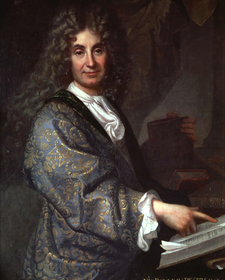Nicolas Boileau-Despreaux
| Nicolas Boileau-Despréaux | |
|---|---|
 |
|
| Born |
1 November 1636 Paris, France |
| Died | 13 March 1711 (aged 74) Paris, France |
| Occupation | Poet, critic |
| Alma mater | College of Sorbonne, Paris |
Nicolas Boileau-Despréaux (French: [nikɔla bwalo depʁeo]; 1 November 1636 – 13 March 1711), often known simply as Boileau, was a French poet and critic. He did much to reform the prevailing form of French poetry, in the same way that Blaise Pascal did to reform the prose. He was greatly influenced by Horace.
Boileau was the fifteenth child of Gilles Boileau, a clerk in the parlement. Two of his brothers attained some distinction: Gilles Boileau, the author of a translation of Epictetus; and Jacques Boileau, who became a canon of the Sainte-Chapelle, and made valuable contributions to church history. The surname "" was derived from a small property at Crosne near Villeneuve-Saint-Georges. His mother died when he was two years old; and Nicolas Boileau, who had a delicate constitution, seems to have suffered something from want of care.
Sainte-Beuve puts down his somewhat hard and unsympathetic outlook quite as much to the uninspiring circumstances of these days as to the general character of his time. He cannot be said to have been early disenchanted, for he never seems to have had any illusions; he grew up with a single passion, "the hatred of stupid books." He was educated at the Collège de Beauvais, and was then sent to study theology at the Sorbonne. He exchanged theology for law, however, and was called to the bar on December 4, 1656. From the profession of law, after a short trial, he recoiled in disgust, complaining bitterly of the amount of chicanery which passed under the name of law and justice. His father died in 1657, leaving him a small fortune, and thenceforward he devoted himself to letters.
Such of Boileau's early poems as have been preserved hardly contain the promise of what he ultimately became. The first piece in which his peculiar powers were displayed was the first satire (1660), in imitation of the third satire of Juvenal; it embodied the farewell of a poet to the city of Paris. This was quickly followed by eight others, and the number was at a later period increased to twelve. A twofold interest attaches to the satires. In the first place the author skilfully parodies and attacks writers who at the time were placed in the very first rank, such as Jean Chapelain, the abbé Charles Cotin, Philippe Quinault and Georges de Scudéry; he openly raised the standard of revolt against the older poets. But in the second place he showed both by precept and practice what were the poetical capabilities of the French language. Prose in the hands of such writers as René Descartes and Blaise Pascal had proved itself a flexible and powerful instrument of expression, with a distinct mechanism and form. But except with Francois de Malherbe, there had been no attempt to fashion French versification according to rule or method. In Boileau for the first time appeared terseness and vigour of expression, with perfect regularity of verse structure.
...
Wikipedia
